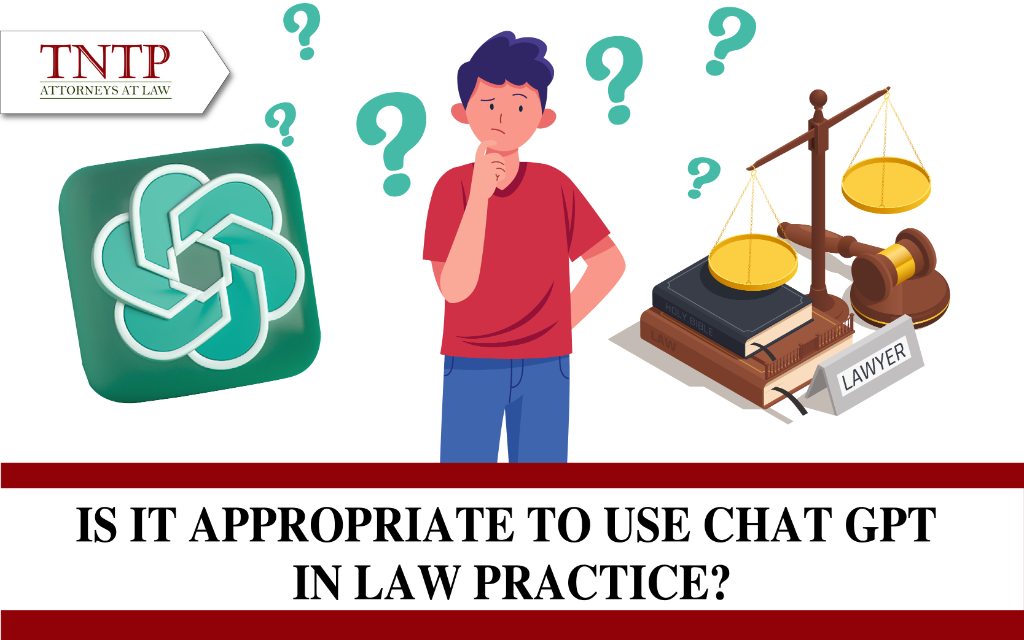Is it appropriate to use ChatGPT in law practice?

ChatGPT is currently one of the most famous chatbot software in the world because of its intelligent communication ability and its ability to answer complex questions in just a few minutes. Many industries in society have begun using ChatGPT as a tool to assist humans in solving problems. So, is using ChatGPT in the law practice appropriate for current trends? Let’s find out about TNTP in this article.
1. Potential of ChatGPT
As mentioned above, ChatGPT is a chatbot that can answer any user’s questions by searching and synthesizing information in a huge database quickly. Unlike traditional search tools like Google which provide a list of answers based on user questions, ChatGPT proactively selects the most suitable answer to the user’s question and synthesizes it into a text. Even when users continue to interact with ChatGPT, it will continue to answer them with very intelligent and reasonable language, very “human-like” compared to previous search tools or AI, which has made ChatGPT’s popularity explode on the Internet.
Many people have tried using ChatGPT to reduce the workload in their work, and the fact has shown that many tasks have been improved with the help of ChatGPT, such as many programmers who have used this tool as a bug-fixing machine for their code and given very positive feedback that ChatGPT detected and fixed about 80% of the programming errors, but with a much faster time than usual.
2. The dark side of ChatGPT
Many American students have applied the ChatGPT tool to solve college entrance exams and have produced worrying results. According to some sources, ChatGPT can pass the final exam of the Wharton School of Business at the University of Pennsylvania, four exams of the Law School of the University of Minnesota, and a part of the United States Medical Licensing Examination, which has led many university leaders in the United States to apply various methods to eliminate or ban students from using this chatbot because if ChatGPT’s power is used for cheating in exams, it will seriously affect the quality of education in the country.
Furthermore, many people have started using this tool to write articles or participate in contests on poetry or literature, making it difficult to distinguish human works from ChatGPT. According to AI researcher Alan Mackworth at the University of British Columbia – Canada, only 52% of the writing can be identified as being written by AI or humans, and this rate is even lower if the AI-generated content has been edited by humans. This shows that the use of ChatGPT, in addition to the visible benefits, also poses significant challenges to society. We used to think that machines could only replace human manual labor, but ChatGPT may force us to seriously consider whether intellectual work can also be replaced by machines in the near future.
3. How does ChatGPT affect the law practice?
With its powerful information synthesis capabilities and vast database, many law firms have begun using ChatGPT in their legal profession. This is understandable because ChatGPT’s strength can be effectively utilized in legal work that requires fast, continuous processing of a wide range of information. In theory, tasks that require lawyers to search and synthesize legal regulations in dozens of legal documents and take several days to study can be solved by ChatGPT in just a few hours if provided with appropriate questions. However, in reality, ChatGPT is having a serious problem with the accuracy of the information it provides, some laws have even been changed or completely wrong. If legal work uses this content, it will directly affect work performance and may provide incorrect information, affecting the interests of clients.
Furthermore, if users implicitly consider ChatGPT’s answers as the final solution, their legal thinking will be dependent on this program, because using ChatGPT to provide solutions to all problems instead of reasoning and evaluating issues themselves will leave their brain with no chance to think and develop. This is particularly dangerous in legal work, which always requires constant thinking to solve work and develop professional skills.
However, the power of ChatGPT cannot be denied, if used correctly, it may provide unreliable and verifiable information, but a quick lookup of information will build a sufficient basic framework. version to solve the problem. With legal issues, if asked the right questions, ChatGPT can give useful suggestions to solve the problem and save a lot of time for lawyers. This is the undeniable benefit of ChatGPT that can be applied in the legal field if we know how to use it.
Similar to the previous industrial revolution in history, the advent and development of new technology create challenges but also create new opportunities for the development of society. ChatGPT is also a technology that will soon have a significant impact on the current law practice of Vietnam and the world. However, as history has proven, it is always better to catch up and use technology to your advantage instead of denying the value of technology and being eliminated, we believe that ChatGPT and AI platforms If used properly, will also be useful and bring high value to the law practice in particular and to society in general.
Best regards,


